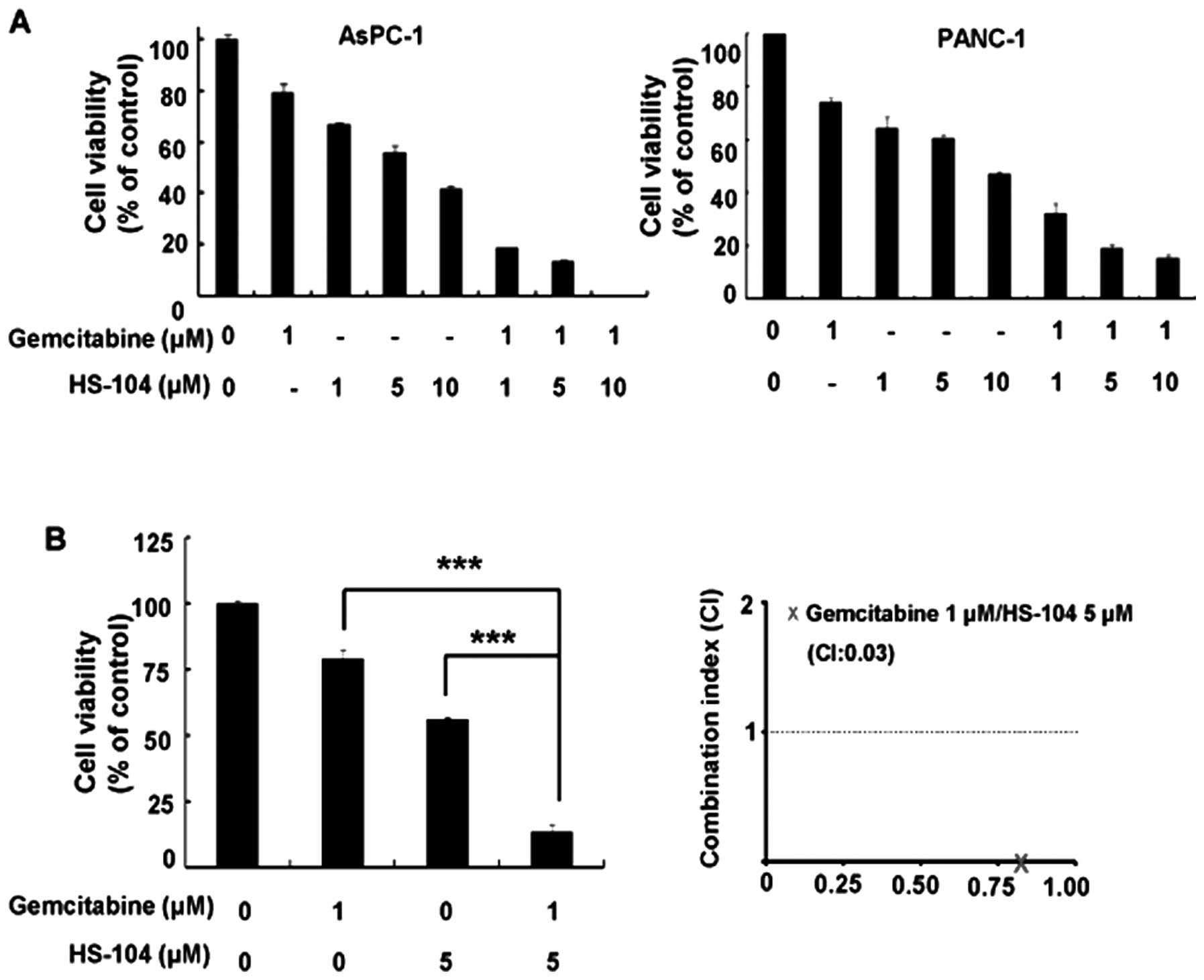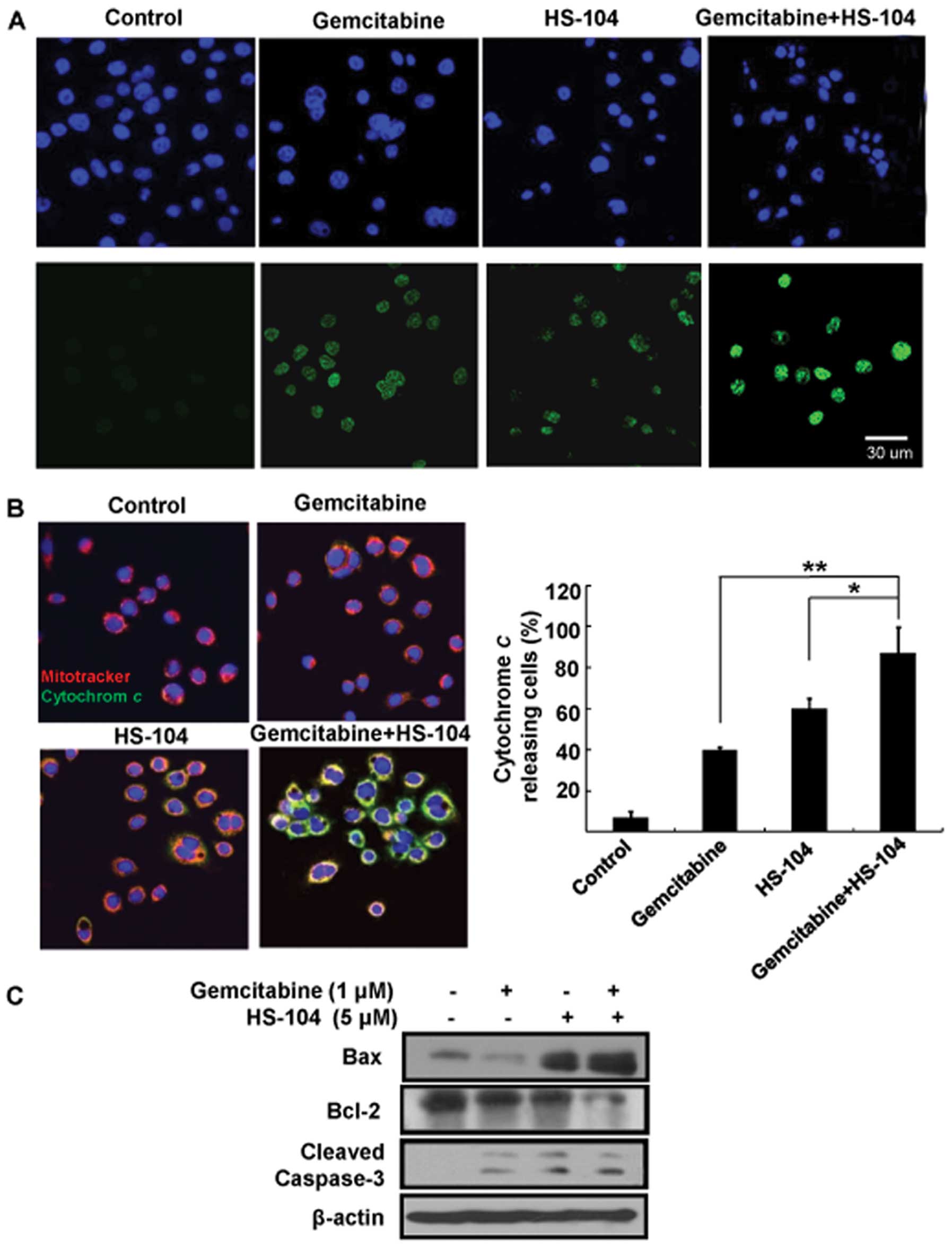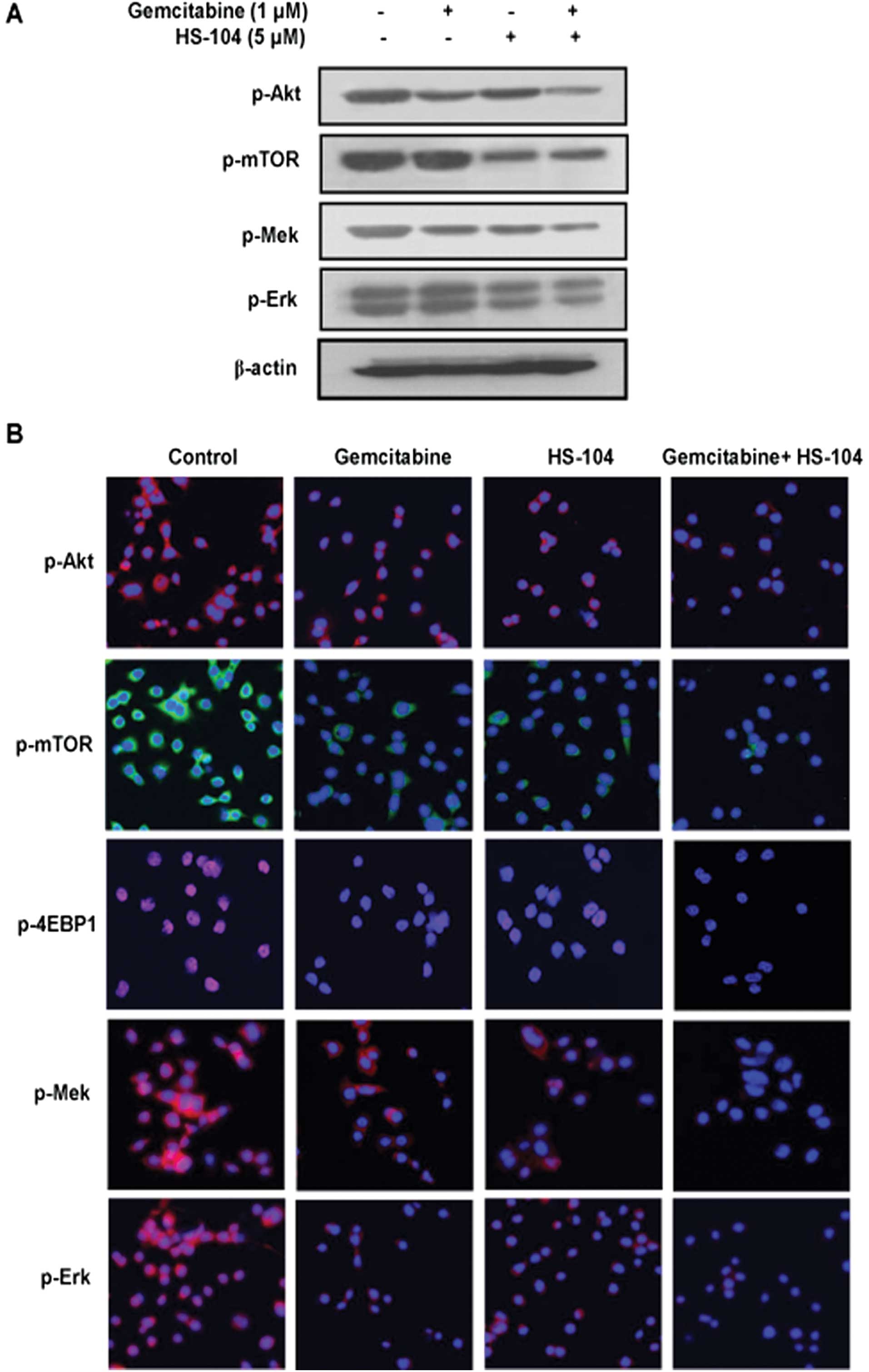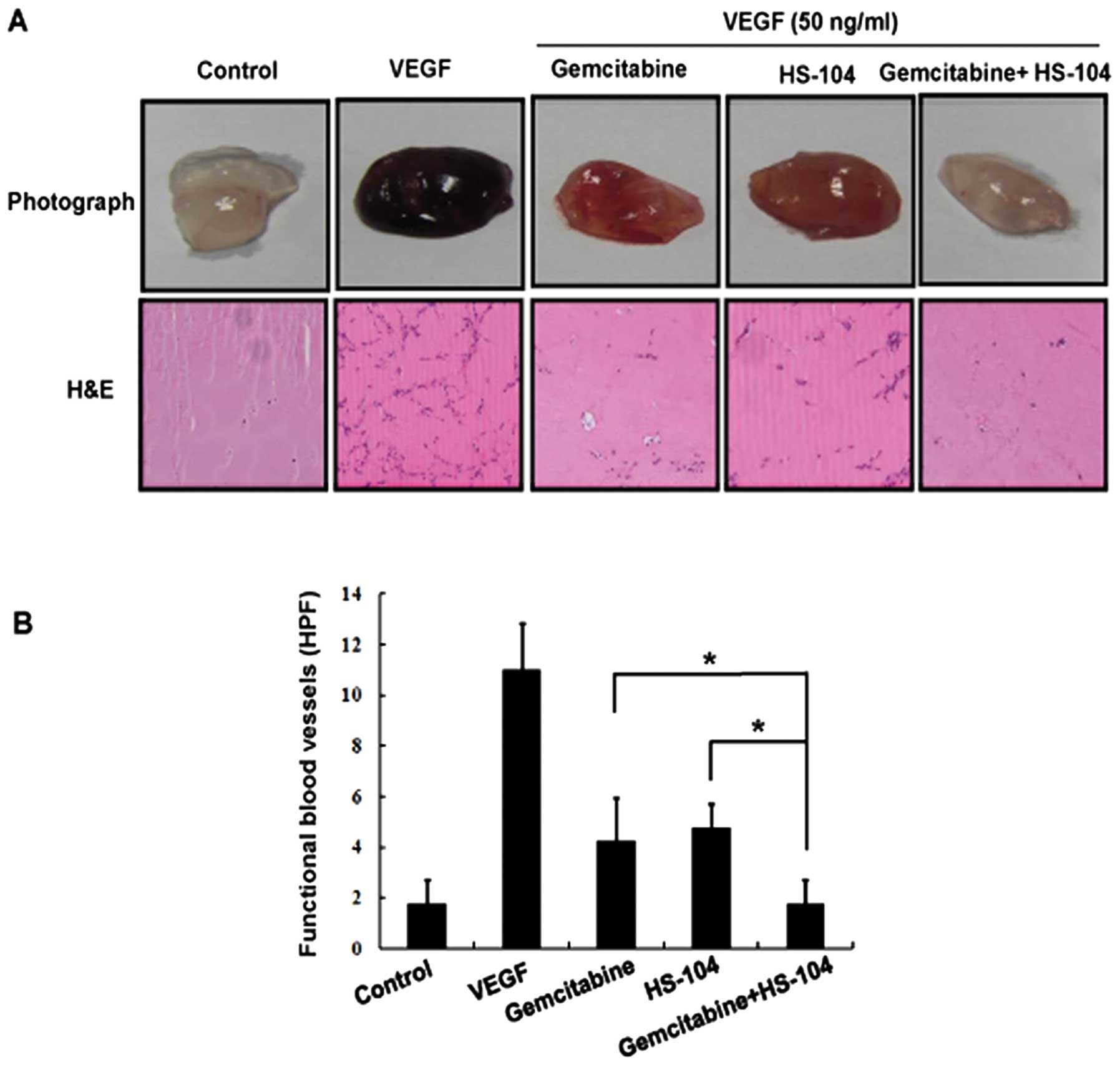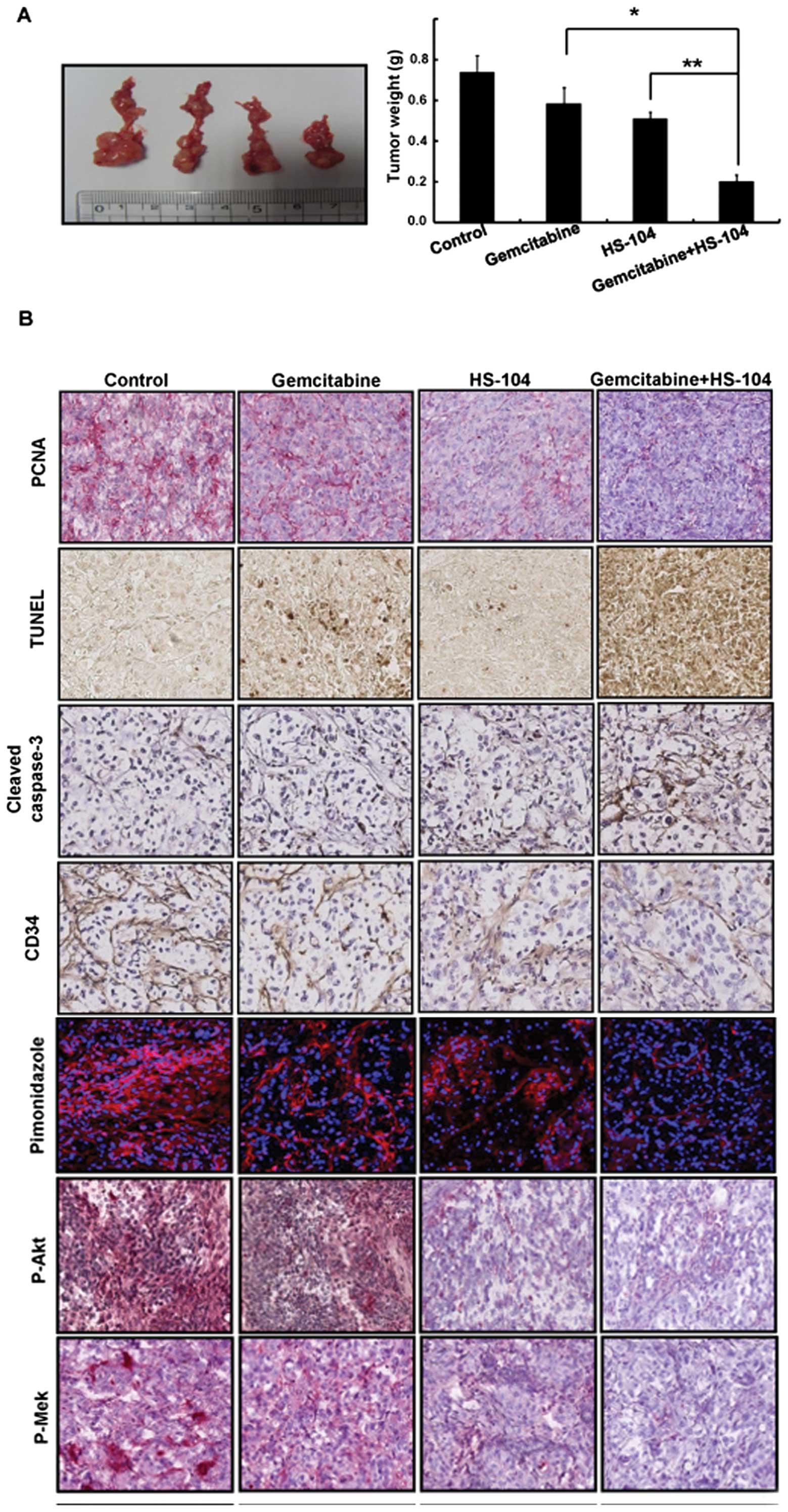|
1.
|
Brothers HM II and Kostic NM: Catalytic
activity of the serine proteases alpha-chymotrypsin and alpha-lytic
protease tagged at the active site with a (terpyridine)platinum(II)
chromophore. Biochemistry. 29:7468–7474. 1990. View Article : Google Scholar : PubMed/NCBI
|
|
2.
|
Burris HA III, Moore MJ, Andersen J, Green
MR, Rothenberg ML, Modiano MR, Cripps MC, Portenoy RK, Storniolo
AM, Tarassoff P, Nelson R, Dorr FA, Stephens CD and Von Hoff DD:
Improvements in survival and clinical benefit with gemcitabine as
first-line therapy for patients with advanced pancreas cancer: a
randomized trial. J Clin Oncol. 15:2403–2413. 1997.PubMed/NCBI
|
|
3.
|
Moore MJ, Goldstein D, Hamm J, Figer A,
Hecht JR, Gallinger S, Au HJ, Murawa P, Walde D, Wolff RA, Campos
D, Lim R, Ding K, Clark G, Voskoglou-Nomikos T, Ptasynski M and
Parulekar W: Erlotinib plus gemcitabine compared with gemcitabine
alone in patients with advanced pancreatic cancer: a phase III
trial of the National Cancer Institute of Canada Clinical Trials
Group. J Clin Oncol. 25:1960–1966. 2007. View Article : Google Scholar
|
|
4.
|
Van Cutsem E, Vervenne WL, Bennouna J,
Humblet Y, Gill S, Van Laethem JL, Verslype C, Scheithauer W, Shang
A, Cosaert J and Moore MJ: Phase III trial of bevacizumab in
combination with gemcitabine and erlotinib in patients with
metastatic pancreatic cancer. J Clin Oncol. 27:2231–2237. 2009.
|
|
5.
|
McGinn CJ, Zalupski MM, Shureiqi I,
Robertson JM, Eckhauser FE, Smith DC, Brown D, Hejna G, Strawderman
M, Normolle D and Lawrence TS: Phase I trial of radiation dose
escalation with concurrent weekly full-dose gemcitabine in patients
with advanced pancreatic cancer. J Clin Oncol. 19:4202–4208.
2001.PubMed/NCBI
|
|
6.
|
Hidalgo M: Pancreatic cancer. N Engl J
Med. 362:1605–1617. 2010. View Article : Google Scholar
|
|
7.
|
Vivanco I and Sawyers CL: The
phosphatidylinositol 3-kinase AKT pathway in human cancer. Nat Rev
Cancer. 2:489–501. 2002. View
Article : Google Scholar : PubMed/NCBI
|
|
8.
|
Cheng JQ, Lindsley CW, Cheng GZ, Yang H
and Nicosia SV: The Akt/PKB pathway: molecular target for cancer
drug discovery. Oncogene. 24:7482–7492. 2005. View Article : Google Scholar : PubMed/NCBI
|
|
9.
|
Martelli AM, Faenza I, Billi AM, Manzoli
L, Evangelisti C, Fala F and Cocco L: Intranuclear
3′-phosphoinositide metabolism and Akt signaling: new mechanisms
for tumorigenesis and protection against apoptosis? Cell Signal.
18:1101–1107. 2006.
|
|
10.
|
Agbunag C and Bar-Sagi D: Oncogenic K-ras
drives cell cycle progression and phenotypic conversion of primary
pancreatic duct epithelial cells. Cancer Res. 64:5659–5663. 2004.
View Article : Google Scholar : PubMed/NCBI
|
|
11.
|
Korc M: Role of growth factors in
pancreatic cancer. Surg Oncol Clin N Am. 7:25–41. 1998.
|
|
12.
|
Vincent F, de Boer J, Pfohl-Leszkowicz A,
Cherrel Y and Galgani F: Two cases of ras mutation associated with
liver hyperplasia in dragonets (Callionymus lyra) exposed to
polychlorinated biphenyls and polycyclic aromatic hydrocarbons. Mol
Carcinog. 21:121–127. 1998. View Article : Google Scholar : PubMed/NCBI
|
|
13.
|
Bardeesy N and DePinho RA: Pancreatic
cancer biology and genetics. Nat Rev Cancer. 2:897–909. 2002.
View Article : Google Scholar
|
|
14.
|
Tong Z, Fan Y, Zhang W, Xu J, Cheng J,
Ding M and Deng H: Pancreas-specific Pten deficiency causes partial
resistance to diabetes and elevated hepatic AKT signaling. Cell
Res. 19:710–719. 2009. View Article : Google Scholar : PubMed/NCBI
|
|
15.
|
Ali S, Banerjee S, Ahmad A, El-Rayes BF,
Philip PA and Sarkar FH: Apoptosis-inducing effect of erlotinib is
potentiated by 3,3′-diindolylmethane in vitro and in vivo using an
orthotopic model of pancreatic cancer. Mol Cancer Ther.
7:1708–1719. 2008.PubMed/NCBI
|
|
16.
|
Izuishi K, Kato K, Ogura T, Kinoshita T
and Esumi H: Remarkable tolerance of tumor cells to nutrient
deprivation: possible new biochemical target for cancer therapy.
Cancer Res. 60:6201–6207. 2000.PubMed/NCBI
|
|
17.
|
Ng SSW, Tsao MS, Chow S and Hedley DW:
Inhibition of phosphatidylinositide 3-kinase enhances
gemcitabine-induced apoptosis in human pancreatic cancer cells.
Cancer Res. 60:5451–5455. 2000.PubMed/NCBI
|
|
18.
|
Yokoi K and Fidler IJ: Hypoxia increases
resistance of human pancreatic cancer cells to apoptosis induced by
gemcitabine. Clin Cancer Res. 10:2299–2306. 2004. View Article : Google Scholar : PubMed/NCBI
|
|
19.
|
Bondar VM, Sweeney-Gotsch B, Andreeff M,
Mills GB and McConkey DJ: Inhibition of the phosphatidylinositol
3′-kinase-AKT pathway induces apoptosis in pancreatic carcinoma
cells in vitro and in vivo. Mol Cancer Ther. 1:989–997. 2002.
|
|
20.
|
Venkannagari S, Fiskus W, Peth K, Atadja
P, Hidalgo M, Maitra A and Bhalla KN: Superior efficacy of
co-treatment with dual PI3K/mTOR inhibitor NVP-BEZ235 and
pan-histone deacetylase inhibitor against human pancreatic cancer.
Oncotarget. 3:1416–1427. 2012.PubMed/NCBI
|
|
21.
|
Kim O, Jeong Y, Lee H, Hong SS and Hong S:
Design and synthesis of imidazopyridine analogues as inhibitors of
phosphoinositide 3-kinase signaling and angiogenesis. J Med Chem.
54:2455–2466. 2011. View Article : Google Scholar : PubMed/NCBI
|
|
22.
|
Jung KH, Zheng HM, Jeong Y, Choi MJ, Lee
H, Hong SW, Lee HS, Son MK, Lee S, Hong S and Hong SS: Suppression
of tumor proliferation and angiogenesis of hepatocellular carcinoma
by HS-104, a novel phosphoinositide 3-kinase inhibitor. Cancer
Lett. 328:176–187. 2013. View Article : Google Scholar : PubMed/NCBI
|
|
23.
|
Lee H, Li GY, Jeong Y, Jung KH, Lee JH,
Ham K, Hong S and Hong SS: A novel imidazopyridine analogue as a
phosphatidylinositol 3-kinase inhibitor against human breast
cancer. Cancer Lett. 318:68–75. 2012. View Article : Google Scholar
|
|
24.
|
Lee KH, Lee JH, Han SW, Im SA, Kim TY, Oh
DY and Bang YJ: Antitumor activity of NVP-AUY922, a novel heat
shock protein 90 inhibitor, in human gastric cancer cells is
mediated through proteasomal degradation of client proteins. Cancer
Sci. 102:1388–1395. 2011. View Article : Google Scholar
|
|
25.
|
Greijer AE, Delis-van Diemen PM, Fijneman
RJ, Giles RH, Voest EE, van Hinsbergh VW and Meijer GA: Presence of
HIF-1 and related genes in normal mucosa, adenomas and carcinomas
of the colorectum. Virchows Arch. 452:535–544. 2008. View Article : Google Scholar
|
|
26.
|
Campbell PM, Groehler AL, Lee KM,
Ouellette MM, Khazak V and Der CJ: K-Ras promotes growth
transformation and invasion of immortalized human pancreatic cells
by Raf and phosphatidylinositol 3-kinase signaling. Cancer Res.
67:2098–2106. 2007. View Article : Google Scholar : PubMed/NCBI
|
|
27.
|
Ruggeri BA, Huang L, Wood M, Cheng JQ and
Testa JR: Amplification and overexpression of the AKT2 oncogene in
a subset of human pancreatic ductal adenocarcinomas. Mol Carcinog.
21:81–86. 1998. View Article : Google Scholar : PubMed/NCBI
|
|
28.
|
Sridhar SS, Hedley D and Siu LL: Raf
kinase as a target for anticancer therapeutics. Mol Cancer Ther.
4:677–685. 2005. View Article : Google Scholar
|
|
29.
|
Siu LL, Awada A, Takimoto CH, Piccart M,
Schwartz B, Giannaris T, Lathia C, Petrenciuc O and Moore MJ: Phase
I trial of sorafenib and gemcitabine in advanced solid tumors with
an expanded cohort in advanced pancreatic cancer. Clin Cancer Res.
12:144–151. 2006. View Article : Google Scholar : PubMed/NCBI
|
|
30.
|
Doege K, Heine S, Jensen I, Jelkmann W and
Metzen E: Inhibition of mitochondrial respiration elevates oxygen
concentration but leaves regulation of hypoxia-inducible factor
(HIF) intact. Blood. 106:2311–2317. 2005. View Article : Google Scholar : PubMed/NCBI
|
|
31.
|
Fujioka S, Niu J, Schmidt C, Sclabas GM,
Peng B, Uwagawa T, Li Z, Evans DB, Abbruzzese JL and Chiao PJ:
NF-kappaB and AP-1 connection: mechanism of NF-kappaB-dependent
regulation of AP-1 activity. Mol Cell Biol. 24:7806–7819. 2004.
View Article : Google Scholar : PubMed/NCBI
|
|
32.
|
Reni M, Balzano G, Aprile G, Cereda S,
Passoni P, Zerbi A, Tronconi MC, Milandri C, Saletti P, Rognone A,
Fugazza C, Magli A, Di Muzio N, Di Carlo V and Villa E: Adjuvant
PEFG (cisplatin, epirubicin, 5-fluorouracil, gemcitabine) or
gemcitabine followed by chemoradiation in pancreatic cancer: a
randomized phase II trial. Ann Surg Oncol. 19:2256–2263. 2012.
View Article : Google Scholar : PubMed/NCBI
|
|
33.
|
Philip PA, Benedetti J, Corless CL, Wong
R, O’Reilly EM, Flynn PJ, Rowland KM, Atkins JN, Mirtsching BC,
Rivkin SE, Khorana AA, Goldman B, Fenoglio-Preiser CM, Abbruzzese
JL and Blanke CD: Phase III study comparing gemcitabine plus
cetuximab versus gemcitabine in patients with advanced pancreatic
adenocarcinoma: Southwest Oncology Group-directed intergroup trial
S0205. J Clin Oncol. 28:3605–3610. 2010. View Article : Google Scholar
|
|
34.
|
Kindler HL, Niedzwiecki D, Hollis D,
Sutherland S, Schrag D, Hurwitz H, Innocenti F, Mulcahy MF,
O’Reilly E, Wozniak TF, Picus J, Bhargava P, Mayer RJ, Schilsky RL
and Goldberg RM: Gemcitabine plus bevacizumab compared with
gemcitabine plus placebo in patients with advanced pancreatic
cancer: phase III trial of the Cancer and Leukemia Group B (CALGB
80303). J Clin Oncol. 28:3617–3622. 2010. View Article : Google Scholar : PubMed/NCBI
|
|
35.
|
Yotsumoto F, Fukami T, Yagi H, Funakoshi
A, Yoshizato T, Kuroki M and Miyamoto S: Amphiregulin regulates the
activation of ERK and Akt through epidermal growth factor receptor
and HER3 signals involved in the progression of pancreatic cancer.
Cancer Sci. 101:2351–2360. 2010. View Article : Google Scholar : PubMed/NCBI
|
|
36.
|
He L, Wu Y, Lin L, Wang J, Chen Y, Yi Z,
Liu M and Pang X: Hispidulin, a small flavonoid molecule,
suppresses the angiogenesis and growth of human pancreatic cancer
by targeting vascular endothelial growth factor receptor 2-mediated
PI3K/Akt/mTOR signaling pathway. Cancer Sci. 102:219–225. 2011.
View Article : Google Scholar
|
|
37.
|
Liu D, Zhang Y, Dang C, Ma Q, Lee W and
Chen W: siRNA directed against TrkA sensitizes human pancreatic
cancer cells to apoptosis induced by gemcitabine through an
inactivation of PI3K/Akt-dependent pathway. Oncol Rep. 18:673–677.
2007.PubMed/NCBI
|
|
38.
|
Yao J and Qian C: Inhibition of Notch3
enhances sensitivity to gemcitabine in pancreatic cancer through an
inactivation of PI3K/Akt-dependent pathway. Med Oncol.
27:1017–1022. 2010. View Article : Google Scholar : PubMed/NCBI
|
|
39.
|
Zhang B, Shi ZL, Liu B, Yan XB, Feng J and
Tao HM: Enhanced anticancer effect of gemcitabine by genistein in
osteosarcoma: the role of Akt and nuclear factor-kappaB. Anticancer
Drugs. 21:288–296. 2010. View Article : Google Scholar : PubMed/NCBI
|
|
40.
|
Soengas MS, Capodieci P, Polsky D, Mora J,
Esteller M, Opitz-Araya X, McCombie R, Herman JG, Gerald WL,
Lazebnik YA, Cordon-Cardo C and Lowe SW: Inactivation of the
apoptosis effector Apaf-1 in malignant melanoma. Nature.
409:207–211. 2001. View Article : Google Scholar : PubMed/NCBI
|
|
41.
|
Wei WT, Chen H, Wang ZH, Ni ZL, Liu HB,
Tong HF, Guo HC, Liu DL and Lin SZ: Enhanced antitumor efficacy of
gemcitabine by evodiamine on pancreatic cancer via regulating
PI3K/Akt pathway. Int J Biol Sci. 8:1–14. 2012. View Article : Google Scholar : PubMed/NCBI
|















